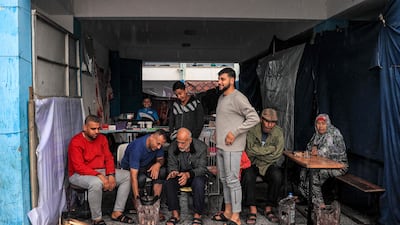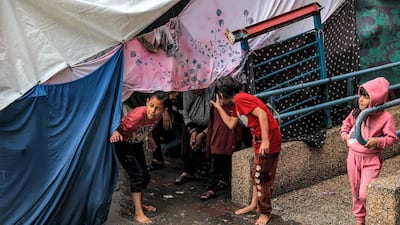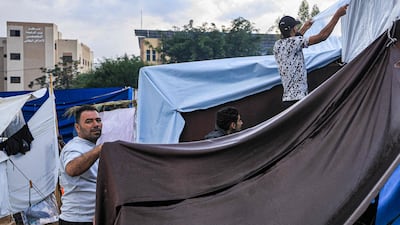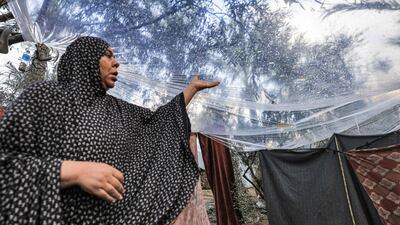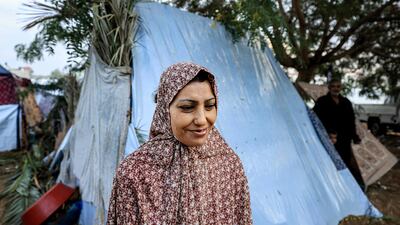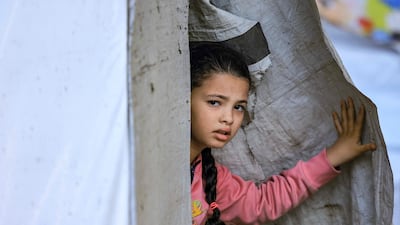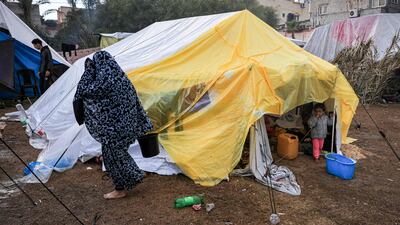Live updates: Follow the latest news on Israel-Gaza
Palestinians in Gaza woke up to rain on Tuesday as the heavy Israeli bombardment continues.
Thousands of Gazans have sought shelter in crowded hospitals, schools and makeshift camps, forced to share cramped quarters as a cold front moves in, heralding the winter season.
But many tents are barely keeping the cold and rain out due to poor construction.
“Our beds are drenched, the makeshift nylon tarps didn't protect us,“ said Ibrahim Salanta, 29, who has been displaced by the war and forced to live in a tent in Khan Younis.
“We are two families of 12 people cramped in a tent, we can't continue in these conditions. This will mean death for us, without clean water, food and dry quarters.”
Most people in Gaza were displaced due to Israeli army warnings to vacate the northern Gaza Strip.
The wet weather is expected to continue through Tuesday night. The remainder of the week will see highs of 24°C and lows of 17°C, with more rain forecast for the weekend.
Women and children are struggling to keep warm, with belongings lost in the move south or Israeli shelling on their homes. Aid coming in from the Rafah border crossing is the only respite for the internally displaced.
“I went to look for some warm clothes for the 14 family members camped in with me under the flimsy nylon tarps and came back to whatever we have drenched by the rain," said Umm Rafiq Al Tarabeesh, who is currently displaced in Khan Younis.
“The nylon tarps are beyond useless, they can't protect us from anything let alone rainfall. We are cold and need some dry, warm clothes to keep us going.”
Humanitarian supplies started to enter Gaza through the Rafah crossing on October 21. There has been no mention of tents or any sort of housing units being sent as part of the relief packages.
Convoys carrying aid from around the world have converged on Rafah, the only border crossing into the besieged Gaza Strip not controlled by Israel.
The UN has long said the aid getting in – mostly water, food and medicine – has fallen far short of the levels needed after more than five weeks of bombardment and a complete blockade by Israel.
Since the start of the war, Jordan has sent $28 million worth of medicine and food to the occupied West Bank and Gaza, government spokesman Muhannad Al Mubaidin said.
The UAE and Qatar have been airlifting supplies to Egypt to be transported into Gaza since the war began on October 7.
To date, more than 168,000 tonnes of aid have been successfully sent to Gaza through the Rafah border.
Rashid Mubarak Al Mansouri, acting secretary general for local affairs at the Emirates Red Crescent, told The National getting supplies to Gazans was crucial, especially with winter approaching.

“We have entrusted a team in Egypt with the task of purchasing all the needs related to winter aid,” he said.
“This includes heating equipment, blankets, winter clothes, food and children’s supplies."
He said the region can be affected by rain and snow throughout winter.
Meanwhile, Andrea De Domenico, the UN humanitarian co-ordinator for the Palestinian territories, said the fuel crisis in Gaza was so dire that no working vehicles were available to deliver the food, water and medicine to those in desperate need.
“Lives in Gaza are hanging by a thread due to the bleeding of fuel and medical supplies,” he said.
A representative for the Egyptian Foreign Ministry insisted Egypt had not closed the Rafah border crossing.
Ahmed Abou Zeid said it was Israel and not Egypt impeding the delivery of aid into Gaza.
More than a month into the war, more than 11,000 Gazans have been killed in Israeli bombardments – more than five times the death toll of the Israel-Hamas war in 2014.
Israel’s blockade of Gaza has left two million people without access to drinking water, food, medical supplies and fuel, leading to the collapse of the health system, with the number of injured having passed 25,000.

